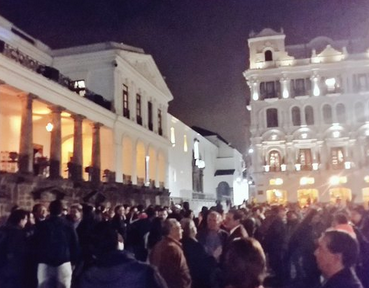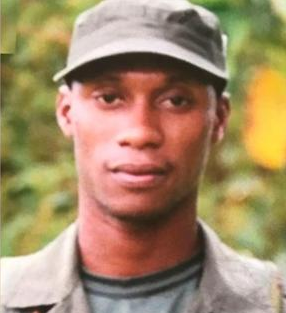Kidnapping of Ecuadorian journalists could be ‘collateral damage’ of Colombian peace process
By Daniela Gallardo and Liam Anderson
The kidnapping of journalists by a dissident group of FARC (Revolutionary Armed Forces of Colombia) on the border with Ecuador represents another complicating factor to Colombia’s road to peace after more than 50 years of armed conflict.

Supporters of kidnapped journalists hold a vigil outside the presidential palace in Quito.
The process has resulted in the turning over of around 9,000 firearms and the lowest murder rate in three decades (24 homicides per 100,000 residents). However, not all of FARC’s members have agreed to the peace agreement, and some have banded together into groups that also include narcotraffickers.
So far this year, four bombs and two car bombs have hit Ecuador. In January 2018, Ecuador’s President Lenín Moreno declared a state of emergency in several areas of the country due to an attack in the town of San Lorenzo in Esmeraldas province on the border with Colombia, which left 14 people injured and caused serious damage to police buildings.
Two weeks ago, three Ecuadorian marines were killed by a roadside bombing.
While the Ecuadorian government was taking stock of the damage, social media and the press raised another alarm: two journalists and a driver from El Comercio newspaper were kidnapped on the morning of 26 March 2018 in the town of Mataje, also in Esmeraldas province.

Walter Patricio Artízala Vernaza is known in southern Colombia as “El Guacho.”
On the day that Interior Minister César Navas confirmed the news, he alongside the defense minister, attorney general, ombudsman, and military and police leaders met with legal representatives of the newspaper and the families of the kidnapped people to advise them about the protocols to follow in these circumstances.
During the press conference in which Navas made the official announcement, he also mentioned the likelihood that those kidnapped would be in Colombia.
According to Colombian military commander General Alberto Mejía, the man behind the kidnapping is the leader of the FARC dissidents in southeast Colombia, Walter Patricio Artízala Vernaza, also known as “Guacho”. The general told RCN Radio that intelligence he had received showed that the guerrilla fighter and men under his command are those holding the Ecuadorians.
Interior Minister Navas told a local radio station that surveillance operations and raids in the border area had upset the dissident FARC groups (which are deemed illegal by the state) and that the kidnappers “are not looking for money [and have not] asked for ransom.”
Collateral damage of a peace process?
César Cedeño, an expert in military operations, analyzed the implications of these incidents. He argued that the case of El Salvador is useful to understand the violence which has come into Ecuador, and that the groups still in the border region should be viewed as hybrids of criminal and insurgent organizations:
“The same happened in the Salvadorian civil war, the maras [gangs] which today are so infamous for their impact on citizens’ safety in Central America and the United States, were a product of that peace process,” Cedeño says. “Ex-guerrillas of the Farabundo Martí Front for National Liberation who did not demobilize used their combat skills to dedicate themselves to criminal activity. These are the maras.”
Cedeño continues: “That case shows that, in effect, this is what could be happening in the Colombian peace process. It is likely that these remnants of FARC have taken a simply rational decision to not demobilize: a calculation of expected profits versus expected costs. If they stay as an insurgency, the returns could be very significant in terms of the narcotics and weapons trade. The cost is what they face already: the constant harrying of the Colombian army and police.”
_________________
Credit: Global Voice, https://globalvoices.org





















